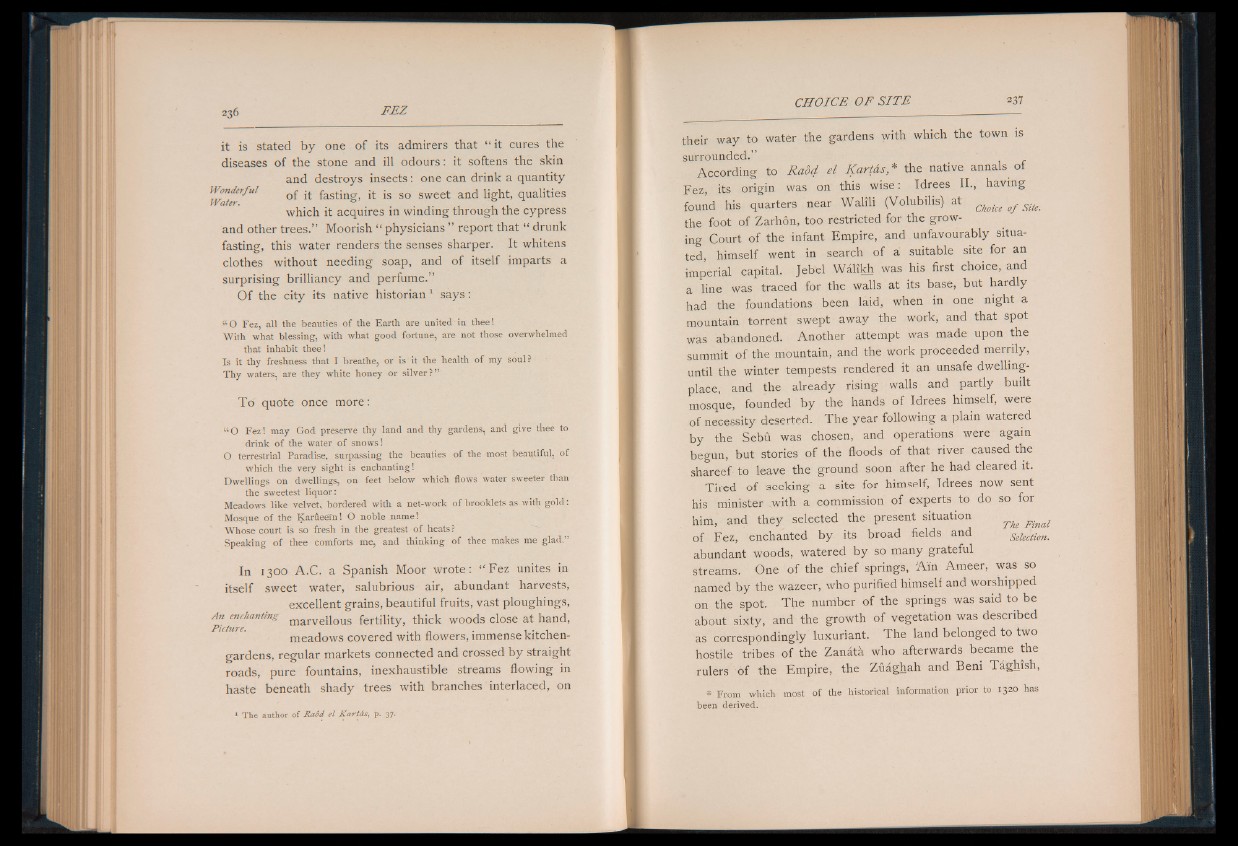
it is stated by one of its admirers that “ it cures the
diseases of the stone and ill odours: it softens the skin
and destroys insects: one can drink a quantity
Wonderful jt fasting, it is so sweet and light, qualities
Water. 0 . . ' ,
which it acquires in winding through the cypress
and other trees.” Moorish “ physicians ” report that “ drunk
fasting, this water renders'the senses sharper. It whitens
clothes without needing soap, and of itself imparts a
surprising brilliancy and perfume.”
Of the city its native historian 1 sa y s :
“ O Fez, all the beauties of the Earth are united in thee!
With what blessing, with what good fortune, are not those overwhelmed
that inhabit thee!
Is it thy freshness that I breathe, or is it the health of my soul ?
Thy waters, are they white honey or silver?”
To quote once more:
“ O Fez! may God preserve thy land and thy gardens, and give thee to
drink of the water of snows!
O terrestrial Paradise, surpassing the beauties of the most beautiful, of
which the very sight is enchanting!
Dwellings on dwellings, on feet below which flows water sweeter than
the sweetest liquor:
Meadows like velvet, bordered with a net-work of brooklets as with gold:
Mosque of the Karueefn! O noble name!
Whose court is so fresh in the greatest of heats ?
Speaking of thee comforts me, and thinking of thee makes me glad.”
In 1300 A.C. a Spanish Moor wrote: “ Fez unites in
itself sweet water, salubrious air, abundant harvests,
excellent grains, beautiful fruits, vast ploughings,
An enchanting marve{joos fertility, thick woods close at hand,
meadows covered with flowers, immense kitchen-
gardens, regular markets connected and crossed by straight
roads, pure fountains, inexhaustible streams flowing in
haste beneath shady trees with branches interlaced, on
CHOICE OF S IT E 237
their way to water the gardens with which the town is
surrounded."
According to Raod el Kartds, * the native annals of
Fez, its origin was on this w ise: Idrees II., having
found his quarters near Walili (Volubilis) at gf | | g
the foot of Zarhon, too restricted for the growing
Court of the infant Empire, and unfavourably situated,
himself went in search of a suitable site for an
imperial capital. Jebel Walikh was his first choice, and
a line was traced for the walls at its base, but hardly
had the foundations been laid, when in one night a
mountain torrent swept away the work, and that spot
was abandoned. Another attempt was made upon the
summit of the mountain, and the work proceeded merrily,
until the winter tempests rendered it an unsafe dwelling-
place, and the already rising walls and partly built
mosque, founded by the hands of Idrees himself, were
of necessity deserted. The year following a plain watered
by the Sebu was chosen, and operations were again
begun, but stories of the floods of that river caused the
shareef to leave the ground soon after he had cleared it.
Tired of seeking a site for himself, Idrees now sent
his minister with a commission of experts to do so for
him, and they selected the present situation A ■
of Fez, enchanted by its broad fields and Selection.
abundant woods, watered by so many grateful
streams. One of the chief springs, A in Ameer, was so
named by the wazeer, who purified himself and worshipped
on the spot. The number of the springs was said to be
about sixty, and the growth of vegetation was described
as correspondingly luxuriant. The land belonged to two
hostile tribes of the Zanata who afterwards became the
rulers of the Empire, the Zuaghah and Beni Taghish,
* From which most of the historical information prior to 1320 has
been derived.